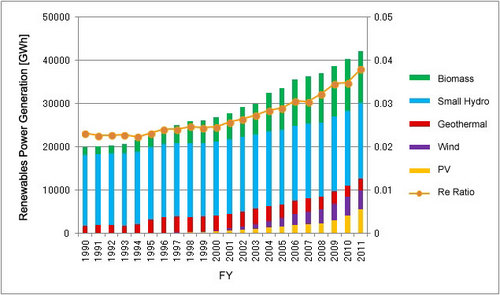August 24, 2013
'Renewables Japan Status Report 2013' Reveals Latest Trends and Challenges
Keywords: Renewable Energy University / Research institute

Estimated figures of renewable power generated in Japan (up to 2011). The percentage of renewables
in Japan's total energy mix including large-scale hydro is about 10.5% (data by ISEP)
The Institute for Sustainable Energy Policies (ISEP), a Japanese non-profit organization, released the "Renewables Japan Status Report 2013" in May 2013. Responding to the dominance of fossil fuels and nuclear power in Japan's energy statistics and to lagging efforts to organize databases and statistics for renewables, since 2010 ISEP has been compiling published data and reporting on the conditions and trends surrounding the introduction of renewables in Japan in its annual "Renewables Japan Status Report."
The percentage of renewables in Japan's total energy mix, excluding large-scale hydro, stands at approximately 3.8 percent. Solar power, which has been growing rapidly compared to other renewables, is estimated at only about 0.5 percent, but its accumulated introduction amount from 1990 to the end of 2012 exceeded seven million kilowatts.
Historical data on the generation amounts provided by solar, wind, biomass and hydro organized by power plant or region has yet to be compiled. Among renewables, only data on geothermal is available on a level of annual generation, because the number of geothermal plants is still small.
Japan urgently needs a new, more comprehensive system for organizing renewable energy statistics so that various parties can share the information and use it to gain wider public understanding. Although monthly records of facilities certified in Japan's new feed-in tariff system are published by prefecture, a complete list of certified facilities and actual records of purchased electric power need to be released. In addition, data on the heat utilization of solar thermal, biomass, and geothermal needs to be built, starting with the number and respective capacities of such facilities that exist and are being introduced.
Hironao Matsubara
Institute for Sustainable Energy Policies
Related JFS Articles
- Japanese NPO Expands Residential Solar Co-Ownership Project
- METI Announces New Buyback Price for Renewable Energy
- Community Power Revolution Spreads in Japan
- Tracking Sustainable Energy Zones in Japan: Status of Renewable Energy Supply in Municipalities
- Report on the Rapid Rise of Renewable Energy Generation Capacity in Japan
Related
"JFS Newsletter"
- 'Yumekaze' Wind Turbine Project Connects Metro Consumers and Regional Producers: Seikatsu Club Consumers' Co-operative
- Shaping Japan's Energy toward 2050 Participating in the Round Table for Studying Energy Situations
- Nishiawakura's Initiative for 100% Energy Self-Sufficiency, and a Municipal ICO Scheme
- Actions Toward 100% Renewable Energy in Japan
- Sustainable Community Building in Shimokawa: Recycling-Oriented Forest Management Enabling Permanent Use of Forest Resources
Related
"Popular Articles"
- Current Status of Renewable Energy in Japan (2015)
- Offshore Wind Farm Withstands Great East Japan Earthquake and Tsunami
- Current Status of Renewable Energy in Japan (2014)
- Geothermal Power: Japan Has World's Third Largest Geothermal Reserves, 60 Percent of Which Can Be Developed
- Tokyo Plans to Increase Renewable Energy Ratio to 20% by 2024


